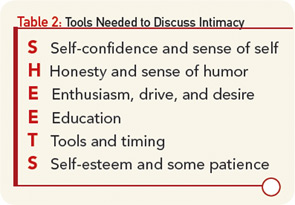Fear of pain during intercourse is another common issue that warrants addressing. Pain, concerns of pain, and disease-related fatigue will decrease libido. The partner of the person who has arthritis needs reassurance since he or she may feel more guilt for being responsible for increasing pain during sex. Change in health status of patients may create a change in the role that individual plays at home and can lead to issues with self-esteem and anxiety.2
Anxiety is a universal phenomenon after any change in health status, including myocardial infarction (MI).4 Although the risk of heart attack during sexual activity is quite low, anxiety has been found to be a contributor for an increased risk of repeat MI. In one study, only 4% of patients received sexual guidance from healthcare providers during their hospital stay following an acute MI.3
We do our patients a service by asking simple questions such as, “How has your (disease state) affected your sexuality and intimate relationships?” Table 2 (at left) includes the mnemonic and tools that both healthcare providers and patients need to facilitate communication. With consideration and compassion, we can help our patients through this difficult discussion and improve their quality of life.
Iris Zink is a nurse practitioner at the Beals Institute in Lansing, Mich.
Top 10 Myths of Sexuality

Thanks to the constant messages portrayed in the media, many myths about sex exist. These myths often need to be dispelled in order for people to be comfortable and confident in their intimate interactions with their partner. Here are the top 10 myths to consider when addressing intimacy questions with your patients.
- Sex always equals intercourse.
- The goal of sex is orgasm.
- General health does not affect sexual health.
- Use of sexual aids is not sexy.
- Good sex just happens.
- Disabled people are not sexual.
- There comes a time when sex is not important.
- My health and physical changes no longer make me sexy.
- I am who I am sexually because of my parts.
- There is nothing more I could possibly learn about sex.
References
- Clayton A, Ramamurthy S. The impact of physical illness on sexual dysfunction. Adv Psychosom Med. 2008;29:70-88.
- Newman AM. Arthritis and sexuality. Nurs Clin North Am. 2007;42:621-630.
- Rosenbaum TY. Musculoskeletal pain and sexual function in women. J Sex Med. 2010;7:645-653.
- Mosack V, Steinke EE. Trends in sexual concerns after myocardial infarction. J Cardiovasc Nurs. 2009:24:162-170.


